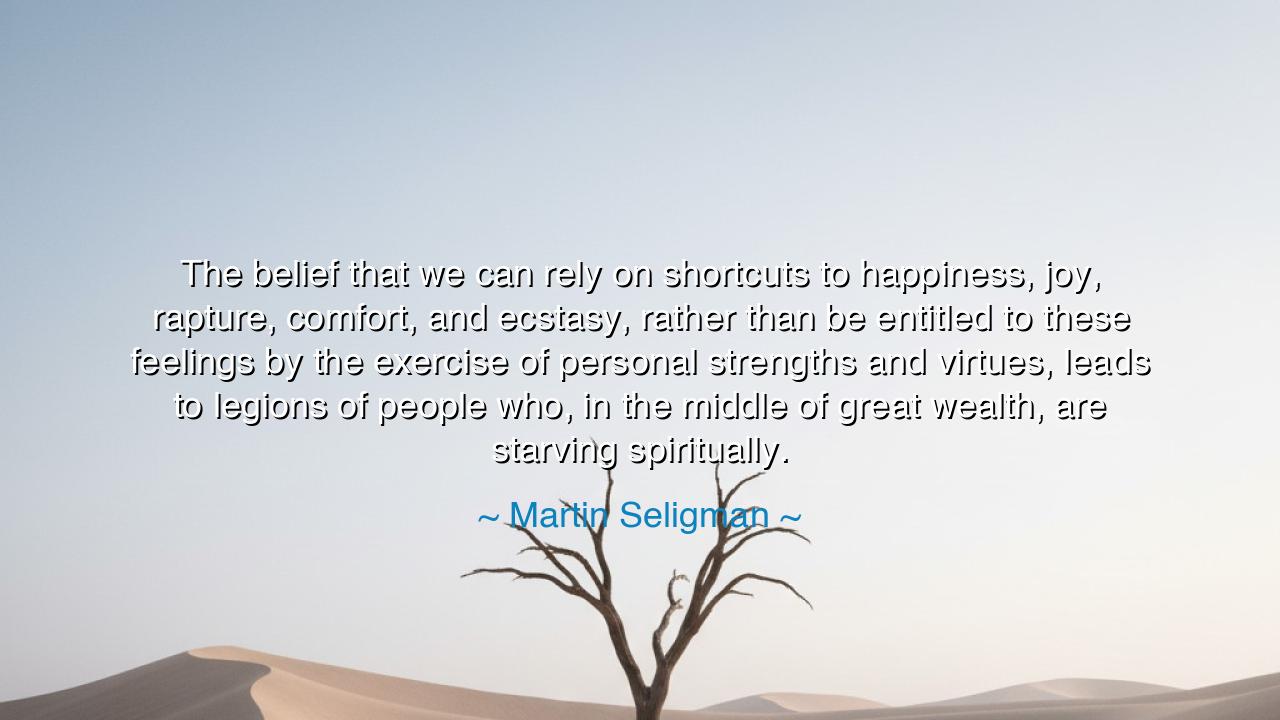
The belief that we can rely on shortcuts to happiness, joy
The belief that we can rely on shortcuts to happiness, joy, rapture, comfort, and ecstasy, rather than be entitled to these feelings by the exercise of personal strengths and virtues, leads to legions of people who, in the middle of great wealth, are starving spiritually.






On the Path of True Fulfillment — The Discipline of the Soul
In an age where abundance surrounds us, Martin Seligman warns of a paradox that echoes through the centuries: that men and women, though rich in comfort, are often starving spiritually. His words—“The belief that we can rely on shortcuts to happiness, joy, rapture, comfort, and ecstasy, rather than be entitled to these feelings by the exercise of personal strengths and virtues”—speak not only of our modern age, but of an eternal human temptation. We seek joy without discipline, peace without purpose, and meaning without effort. Yet such pleasures, bought cheaply, vanish swiftly, leaving the heart hollow and unsatisfied.
The ancients knew that all true happiness is earned, not granted. The Greeks called it eudaimonia—the flourishing of the soul that arises when a person lives with virtue. They taught that no feast of gold or wine could nourish a man who had abandoned courage, wisdom, and temperance. For what is joy, if not the echo of a soul in harmony with truth? What is comfort, if not the rest that follows righteous labor? The great error of humanity, Seligman reminds us, is to seek the fruit of virtue without planting its seed—to crave rapture without righteousness, ecstasy without endurance.
There was once a king, ancient and mighty, who had every luxury that earth could offer—palaces of marble, musicians whose songs floated like silk through the air, servants who bent to his slightest wish. Yet his nights were restless. His food lost its taste, and his heart turned cold. One day, disguised as a beggar, he wandered into the countryside and met a farmer tilling the soil with worn hands and a joyful song. The king asked, “Why do you sing when your life is so hard?” The farmer replied, “Because each harvest is mine by the sweat of my brow, and each dawn greets me with peace.” The king returned to his palace in silence, for he had found the truth: that happiness is not given—it is earned through labor of the heart and spirit.
Seligman, a modern philosopher of the mind, teaches us what the ancients lived: that the strength of character—courage, integrity, perseverance, gratitude, and compassion—is the soil from which real joy grows. When we abandon these, and chase instead the illusions of pleasure—comfort bought by wealth, validation from others, distraction through indulgence—we become like those who drink salt water to quench their thirst. The more we consume, the emptier we become.
Look around the modern world, and see the proof of his warning: people surrounded by great wealth, yet restless and anxious, scrolling endlessly through the hollow reflections of others’ lives. They seek shortcuts—instant gratification, easy praise, fleeting entertainment—and in so doing, they trade the gold of meaning for the dust of momentary escape. They forget that joy is not found in the momentary thrill, but in the discipline of virtue, the slow and patient building of a life that matters.
This teaching, then, is both stern and merciful. It calls us back to the path of strength, to the sacred labor of the spirit. The joy that endures is not the lightning flash of indulgence, but the steady flame of purpose. If one would find rapture, let them practice gratitude daily. If one would know comfort, let them forgive their enemies. If one would find ecstasy, let them love honestly and work diligently. These are the virtues that entitle the soul to peace—and no other road will lead there.
Therefore, my children, learn this truth: there are no shortcuts to happiness. Every heart must climb its own mountain, every spirit must temper itself in the fire of patience and integrity. Do not envy those who seem to feast while you labor; their table is full, but their spirit hungers. Instead, cultivate the quiet strength of a soul at peace with itself. Let your joy come not from what you possess, but from who you become.
And in the end, when wealth and praise fade like mist at sunrise, you will stand rich in the only treasure that endures—the joy that arises from virtue, the rapture born of truth, and the comfort of a soul that has earned its own light. Then, though the world may call you poor, you will walk among the truly blessed, for your heart will never again know spiritual hunger.






AAdministratorAdministrator
Welcome, honored guests. Please leave a comment, we will respond soon